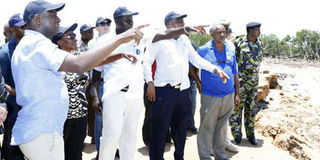Infrastructure projects: We need to debate our long-term interests

Energy CS Charles Keter (left) and Uganda’s Minister for Energy and Mineral Development Irene Muloni listen to Lapsset Director-General Sylvester Kasuku when they toured the proposed site for Lamu port. FILE PHOTO | NATION MEDIA GROUP
What you need to know:
Uganda will not allow the crude oil pipeline to pass through Kenya.
In my view, even Kampala’s argument about the security situation around the route we have proposed does not wash.
- Museveni has calculated that the refinery is how he can achieve geostrategic leverage to make it possible for him to continue playing the dominant factor in this part of the region.
I think that Uganda and Tanzania are just stringing us along, acting as our good friends and partners in the East African Community, while constantly jostling for tactical advantage over us in an endless cloak-and-daggers game over economic dominance of the region.
You can choose to look at the shabby treatment which the Tanzanians accorded Energy Minister Charles Keter the other day in Tanga as a minor incident of little diplomatic significance, but in the context of the battle over geostrategic significance between the three major economies in East Africa, this incident spoke volumes.
Clearly, President Yoweri Museveni has decided to teach us a lesson about the Monroe Doctrine: that countries do not have permanent friends or enemies and that what they have are permanent interests.
Uganda will not allow the crude oil pipeline to pass through Kenya.
Kampala argues that land compensation costs in Kenya are prohibitive and likely to push the cost of constructing the pipeline through the roof.
Uganda has also cited insecurity as a reason for not letting the pipeline pass through our country.
This despite the fact that we have even offered to allow the proposed pipeline to follow the Kenya Pipeline Company’s wayleave, insulating the project from incurring prohibitive land compensation costs.
MUSEVENI'S AMBITION
In my view, even Kampala’s argument about the security situation around the route we have proposed does not wash.
Can they not see that KPC has been operating an oil pipeline on this route for more than 30 years without any major security breaches?
The truth of the matter is that President Museveni has decided that Uganda’s long-term interest is unfettered and guaranteed access to a sea port.
He has also calculated that as long as he can build his refinery in Hoima, from where he can sell products to the landlocked countries of Rwanda, Burundi, and Northern Democratic Republic of the Congo, he is fine.
After all, we all know that President Museveni has always had the ambition to be a dominant factor in this part of the region
He has calculated that the refinery is how he can achieve geostrategic leverage to make it possible for him to continue playing the dominant factor in this part of the region.
As far as the position of Total is concerned, I will cite failure of diplomacy on our part.
From what I gather, we took long to start seriously engaging the French company even when we had the opportunity.
In my view, serious oil diplomacy did not start until President Uhuru Kenyatta appointed Mr Andrew Kamau permanent secretary in the State Department of Petroleum.
An oil industry expert with years of experience with large international trading companies, oil exploration firms, and marketing, he is credited with giving our oil diplomacy a new geostrategic vision.
The diplomatic stand-off with Uganda over the pipeline route got me reflecting about how the next phase of the standard gauge railway — the section between Nairobi to Malaba — stands in terms of Uganda’s permanent interests.
VULNERABILITY
What if Uganda changes its mind and decides that extending the standard gauge railway from Malaba all the way to Kasese is not in its long-term interest and, therefore, not a high priority item?
This would kill us because the economic viability of the section between Nairobi to Malaba is premised on traffic to Kampala and Rwanda.
Thus, in the event that Kampala delays building its part of the SGR, there will be negative implications on the economic viability of the railway.
Mark you, we have just signed a massive $1.5 billion agreement to build the section between Nairobi and Naivasha.
On September 18, last year, the Cabinet decided that the route will be Naivasha-Narok-Bomet-Kisumu-Yala-Bumala-Malaba.
We are borrowing $4.8 billion from the China Exim Bank for the 262 kilometre section between Naivasha and Malaba.
The Chinese have introduced a condition that before Uganda can secure funding for their railway section from China Exim Bank, Kenya must conclude the engineering procurement contract with a Chinese company for the section between Naivasha and Malaba.
When we build big infrastructure projects that connect us with the major economies of East Africa, we must look and debate permanent interests and geostrategic significance.
In my view, our future lies in opening transport corridors between us and South Sudan and Ethiopia.
On the crude oil pipeline, we must accept that Uganda and Tanzania have snookered us.





